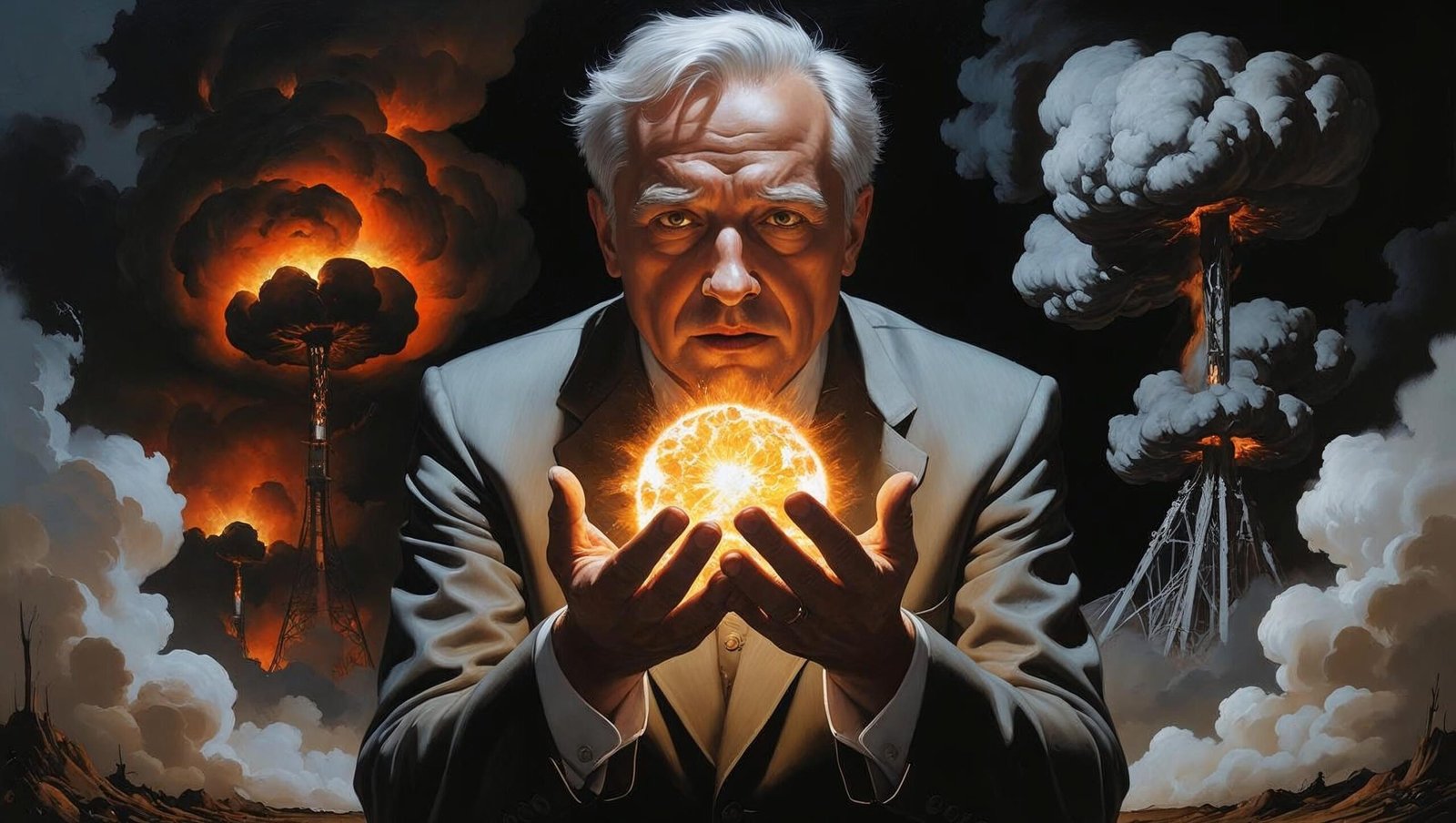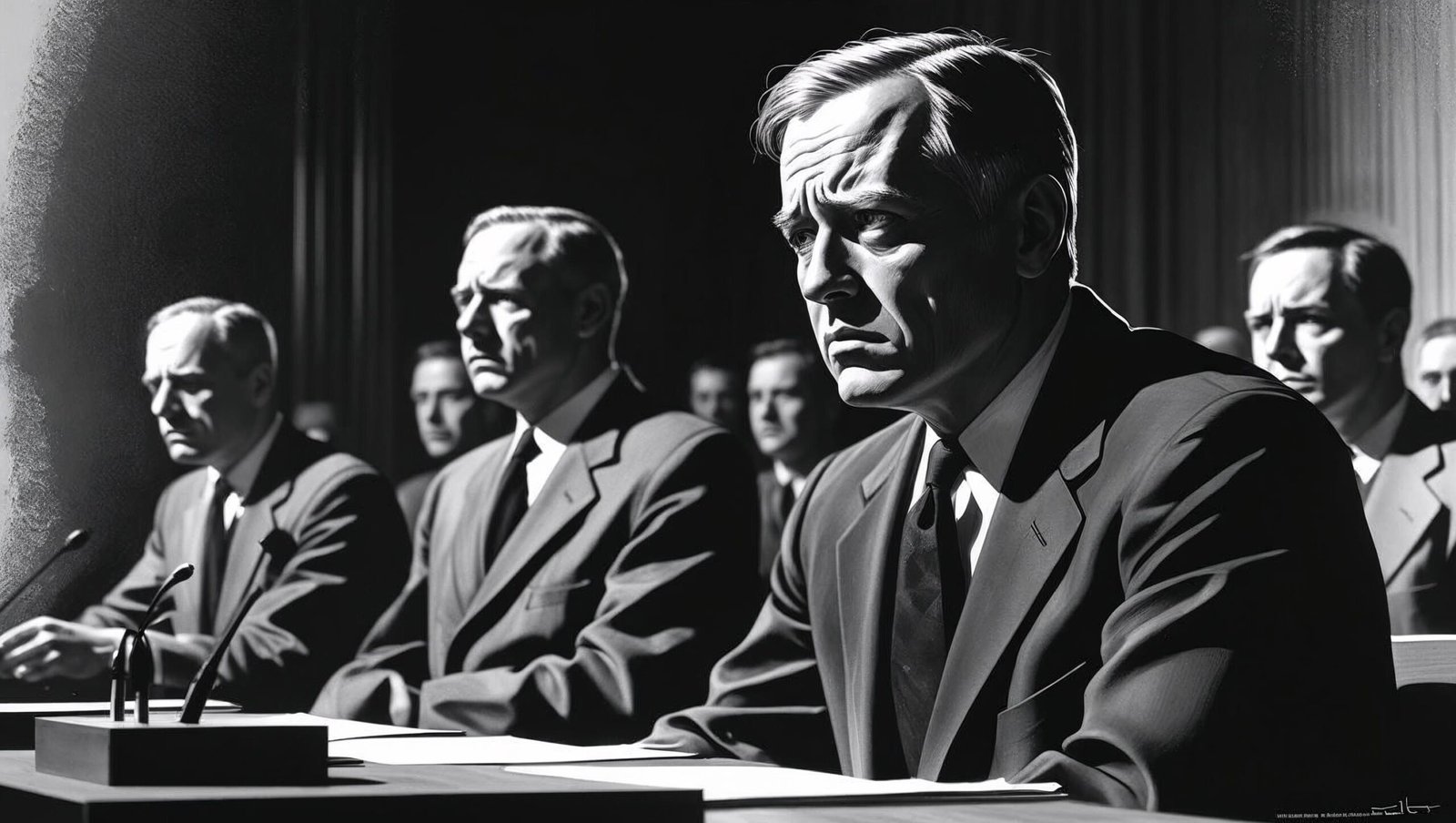American Prometheus Summary – 7 Shocking Lessons from the Life of J. Robert Oppenheimer
The american prometheus summary is more than a retelling of history—it is a profound exploration of the life and legacy of J. Robert Oppenheimer, the man who led the creation of the atomic bomb. Authored by Kai Bird and Martin J. Sherwin, American Prometheus: The Triumph and Tragedy of J. Robert Oppenheimer won the Pulitzer Prize for its depth, nuance, and masterful storytelling.
This american prometheus summary reveals Oppenheimer’s brilliance, his moral struggles, his rise as a national hero, and his tragic fall into political disgrace. Beyond recounting facts, the biography serves as a cautionary tale about science, ambition, and responsibility.
In this post, we uncover seven shocking lessons that emerge from Oppenheimer’s extraordinary yet conflicted journey.

Lesson 1: The Making of a Scientific Genius
The american prometheus summary begins with Oppenheimer’s privileged upbringing in New York City, where his intellectual brilliance was evident early. From Harvard to Cambridge and Göttingen, he absorbed knowledge at an astonishing pace. His early career marked him as a pioneer in quantum mechanics, establishing him as a respected voice in theoretical physics.
Yet, Bird and Sherwin reveal that this brilliance was shadowed by emotional fragility and personal insecurity. His contradictions—genius paired with vulnerability—set the stage for his dramatic life story.
Lesson 2: Leadership During the Manhattan Project
The american prometheus summary highlights Oppenheimer’s unexpected role as director of Los Alamos during World War II. Despite his lack of administrative experience, he united brilliant scientists and drove them to achieve what once seemed impossible: building the first atomic bomb.
Here, Bird and Sherwin capture not just the technical achievement but the profound ethical weight Oppenheimer carried. His charisma and intellect made him an effective leader, but he remained haunted by the consequences of the weapon he helped create.
Lesson 3: The Burden of Conscience
Central to the american prometheus summary is Oppenheimer’s moral reckoning. While he initially celebrated the scientific triumph of the atomic bomb, he soon became consumed by guilt over its use in Hiroshima and Nagasaki.
His haunting quote, borrowed from the Bhagavad Gita—“Now I am become Death, the destroyer of worlds”—reflects his inner torment. The biography shows how he tried to influence nuclear policy by opposing the hydrogen bomb, placing him at odds with political leaders.
Lesson 4: The Political Downfall
The american prometheus summary cannot ignore Oppenheimer’s devastating security hearing in 1954. Once hailed as a national hero, he was accused of communist sympathies and deemed a security risk.
Bird and Sherwin detail this brutal betrayal, showing how Cold War paranoia stripped Oppenheimer of his influence. His downfall is portrayed not only as a personal tragedy but also as a warning about political hysteria and the fragility of truth in an age of fear.
Lesson 5: The Tragic Hero Archetype
The american prometheus summary places Oppenheimer firmly in the mold of a tragic hero. Like Prometheus, who gave fire to mankind and suffered for it, Oppenheimer gave atomic fire to the world and was punished by the very society he sought to protect.
His flaws—arrogance, insecurity, political naïveté—intertwined with his brilliance, making his life both inspiring and heartbreaking. This tragic duality is what makes the biography such a timeless work.
Lesson 6: Science, Power, and Responsibility
A central theme of the american prometheus summary is the tension between scientific discovery and ethical responsibility. Oppenheimer’s story forces readers to confront uncomfortable questions: should scientists be accountable for how their discoveries are used?
Bird and Sherwin argue that Oppenheimer’s downfall was not about espionage but about conscience. He refused to ignore the moral implications of nuclear power, and this refusal made him a target in a politically charged era.

Lesson 7: Legacy Beyond the Atomic Age
The final insight in the american prometheus summary is that Oppenheimer’s legacy extends far beyond the nuclear age. His dilemmas resonate today in debates about artificial intelligence, biotechnology, and modern weapons of mass destruction.
His life is a reminder that the pursuit of knowledge cannot be separated from responsibility. Bird and Sherwin’s biography positions Oppenheimer as both a product of his time and a timeless figure whose struggles remain relevant.
Deeper Historical Context of Oppenheimer’s Era
To expand the american prometheus summary, one must situate Oppenheimer within the turbulent historical backdrop of the twentieth century. His life unfolded during a period of seismic change—two world wars, the Great Depression, the rise of fascism and communism, and the dawn of the nuclear age. Each of these events profoundly shaped his worldview.
The scientific community of the early 20th century was vibrant with discoveries that altered humanity’s understanding of reality. Einstein had revolutionized physics with relativity, while Niels Bohr, Werner Heisenberg, and others explored quantum mechanics. Into this ferment stepped Oppenheimer, who bridged the gap between European intellectual traditions and American pragmatism. His ability to synthesize complex ideas and communicate them effectively made him an invaluable figure.
The biography demonstrates that Oppenheimer was not just a product of his times but also a shaper of them. His direction of the Manhattan Project accelerated the end of World War II but simultaneously birthed an arms race that would dominate global politics for decades.
Oppenheimer’s Personal Relationships
The american prometheus summary also draws attention to Oppenheimer’s complicated personal life. He was charismatic yet enigmatic, capable of inspiring loyalty while also frustrating colleagues with his contradictions.
His marriage to Katherine “Kitty” Puening, herself a complex figure with ties to leftist politics, reflected both companionship and strain. The biography presents Kitty as supportive yet volatile, adding further tension to Oppenheimer’s personal struggles. His earlier relationship with Jean Tatlock, a psychiatrist and member of the Communist Party, was another defining aspect of his emotional world. Tatlock’s tragic death left an indelible mark on him and later provided fodder for suspicion during his security hearings.
Bird and Sherwin emphasize that Oppenheimer’s personal entanglements were not mere side notes but integral to his downfall. His associations, whether intellectual or romantic, became weaponized against him in an era of paranoia.
Intellectual Influences and Worldview
A crucial expansion in the american prometheus summary involves understanding Oppenheimer’s intellectual influences. He was not a narrow physicist but a polymath deeply interested in literature, philosophy, and Eastern spirituality. His fascination with the Bhagavad Gita shaped his interpretation of the bomb’s destructive power, while his readings of French literature and poetry enriched his worldview.
This broad intellectual scope made him stand out among scientists. He saw physics not merely as equations and experiments but as part of humanity’s broader quest for meaning. Yet, this very expansiveness sometimes unsettled colleagues who preferred clarity over complexity.
The Paradox of Patriotism and Alienation
The american prometheus summary must also recognize Oppenheimer’s paradoxical relationship with patriotism. On one hand, he devoted himself to the Manhattan Project with fervor, believing that defeating Nazi Germany justified the bomb’s creation. On the other hand, his postwar advocacy for international cooperation and nuclear regulation alienated him from powerful political figures.
This paradox illustrates the difficulty of reconciling scientific ethics with national loyalty. Oppenheimer was deeply American yet cosmopolitan in outlook, loyal to his nation yet critical of its policies. This tension ultimately cost him his security clearance and his public stature.

The 1954 Hearing in Greater Detail
No expansion of the american prometheus summary would be complete without delving deeper into the infamous 1954 Atomic Energy Commission hearing. The hearing was ostensibly about security, but in reality, it was a political spectacle designed to discredit Oppenheimer.
Bird and Sherwin reconstruct the atmosphere of suspicion, where hearsay and insinuation mattered more than facts. Old friendships, intellectual curiosity about communism, and even Oppenheimer’s earlier resistance to developing the hydrogen bomb were twisted into evidence of disloyalty.
Despite support from many colleagues, the verdict was predetermined. Oppenheimer was stripped of his clearance, symbolically exiled from the inner circle of American science and politics. This humiliation, broadcast across the nation, marked the tragic climax of his life.
Oppenheimer’s Later Years
The american prometheus summary also provides insight into Oppenheimer’s final decades. After the hearing, he withdrew from public influence but did not completely retreat into obscurity. He accepted the directorship of the Institute for Advanced Study at Princeton, where he fostered intellectual exchanges among leading thinkers.
Though diminished politically, he remained respected within scientific circles. In the 1960s, there was even a partial rehabilitation of his image, culminating in President Lyndon Johnson awarding him the Enrico Fermi Award in 1963. Yet, this recognition could not erase the pain of his earlier disgrace.
Oppenheimer died in 1967, succumbing to throat cancer. Bird and Sherwin present his final years as reflective rather than bitter, though the shadow of his downfall never truly lifted.
Themes of Hubris and Responsibility
Expanding the american prometheus summary also requires reflection on the broader themes of hubris and responsibility. Oppenheimer, like Prometheus, sought to harness forces beyond ordinary comprehension. His triumph was dazzling, but his hubris—believing he could control political outcomes as he had managed scientific ones—proved fatal.
The biography underscores that knowledge without wisdom leads to peril. The atomic bomb was not just a weapon; it was a Pandora’s box. Oppenheimer’s attempts to contain its consequences show the limits of human foresight once a discovery has been unleashed.
Lessons for Modern Science and Technology
The american prometheus summary is especially relevant for today’s debates about artificial intelligence, biotechnology, and climate science. Oppenheimer’s story illustrates that scientists cannot avoid the moral consequences of their work. Discoveries may promise progress, but without ethical frameworks, they risk catastrophe.
As policymakers grapple with issues like autonomous weapons or genetic engineering, Oppenheimer’s example remains instructive. His struggle reveals the importance of courage in confronting political pressures and insisting on responsibility.
Comparisons with Other Scientific Figures
In broadening the american prometheus summary, Bird and Sherwin’s portrayal invites comparison with figures like Albert Einstein and Edward Teller. Einstein, though not directly involved in the bomb’s construction, shared Oppenheimer’s concerns about nuclear escalation. Teller, by contrast, championed the hydrogen bomb and played a key role in Oppenheimer’s political downfall.
These contrasts illuminate the spectrum of scientific responses to moral dilemmas. Oppenheimer occupied the middle ground—committed to science yet painfully aware of its dangers. His tragedy lay in his inability to fully reconcile the two.

Literary Qualities of the Biography
The american prometheus summary would be incomplete without appreciation of the biography’s literary merits. Bird and Sherwin write with both precision and narrative flair. Their style blends rigorous scholarship with vivid storytelling, making complex scientific and political issues accessible to general readers.
The book does not merely present facts but weaves them into a compelling narrative arc, giving Oppenheimer’s life the weight of classical tragedy. This literary quality distinguishes it from more technical histories and ensures its enduring relevance.
Why the Book Resonates with Readers
The american prometheus summary also explains why the biography resonates so strongly with readers. It appeals not only to those interested in history or science but also to anyone grappling with questions of morality, ambition, and human frailty.
Oppenheimer’s story is universal—it is about the cost of genius, the fragility of reputation, and the complexity of living with one’s choices. In an age of rapid innovation, his dilemmas strike a chord with modern audiences.
Reflections on Prometheus and Myth
Finally, the american prometheus summary gains depth from reflecting on the mythological parallel. Prometheus defied the gods to give fire to mankind, symbolizing both progress and punishment. Oppenheimer, too, gave humanity unprecedented power, only to face ruin.
This mythological framing elevates the biography beyond history, placing it within the timeless human struggle between creation and destruction, ambition and humility. It forces us to ask whether humanity, like Oppenheimer, is destined to repeat the same cycle of triumph and tragedy.
Final Reflection
The biography of J. Robert Oppenheimer reminds us that the greatest figures in history are often the most complex. His brilliance in theoretical physics was matched only by his vulnerability to political intrigue and his deep sense of moral questioning. The book is not simply a record of events, but an invitation to think critically about the intersection of science, ethics, and human responsibility.
Readers are left with more than an impression of a man; they inherit the dilemmas he faced, which continue to echo in modern debates on technology and power. Engaging with such a narrative provides perspective not only on the past but also on the choices that will shape humanity’s future.
The Authors’ Achievement
The american prometheus summary must also recognize the extraordinary efforts of Kai Bird and Martin J. Sherwin. After more than two decades of research, they crafted a biography that is both academically rigorous and emotionally compelling.
Their narrative balances historical accuracy with vivid storytelling, creating a portrait that is honest, empathetic, and deeply human. This achievement explains why American Prometheus received the Pulitzer Prize and continues to influence readers worldwide.

Why American Prometheus Matters Today
The american prometheus summary emphasizes that Oppenheimer’s story is not locked in the past. In today’s world, where technology evolves faster than ethics, his life offers urgent lessons.
Just as nuclear weapons reshaped geopolitics in the 20th century, today’s innovations—artificial intelligence, genetic engineering, cyberwarfare—pose similar ethical dilemmas. Reading about Oppenheimer compels us to reflect on whether we are prepared to handle the consequences of our discoveries.
Frequently Asked Questions (FAQs)
Q1. What is American Prometheus about?
American Prometheus is a Pulitzer Prize-winning biography of J. Robert Oppenheimer, focusing on his role in the Manhattan Project, his moral struggles, and his political downfall.
Q2. Who wrote American Prometheus?
The biography was authored by Kai Bird and Martin J. Sherwin after over twenty years of research.
Q3. Why is it called American Prometheus?
The title draws from Greek mythology, comparing Oppenheimer to Prometheus, who brought fire to mankind and suffered punishment for it.
Q4. How long is the book?
The book spans more than 700 pages, offering a comprehensive account of Oppenheimer’s life.
Q5. Is this biography relevant today?
Yes. As shown in this american prometheus summary, Oppenheimer’s story raises timeless questions about science, ethics, and responsibility that remain crucial today.
Conclusion
The american prometheus summary reveals not only the biography of J. Robert Oppenheimer but also the broader human struggle with ambition, morality, and responsibility.
Through Kai Bird and Martin J. Sherwin’s meticulous narrative, we witness a man who embodied both triumph and tragedy. Oppenheimer’s life is a cautionary tale about the dangers of unchecked ambition, the weight of scientific responsibility, and the fragility of truth in politically charged times.
For readers seeking a profound exploration of history, science, and ethics, American Prometheus is essential. It is not just a story of one man but a reflection of humanity’s ongoing challenges in balancing knowledge with wisdom.
Visit shubhanshuinsights.com for more in-depth reviews, summaries, and insights into books that illuminate the human condition.
Let us remember Oppenheimer’s life as both an inspiration and a warning, urging humanity to balance wisdom, responsibility, courage, and compassion always.